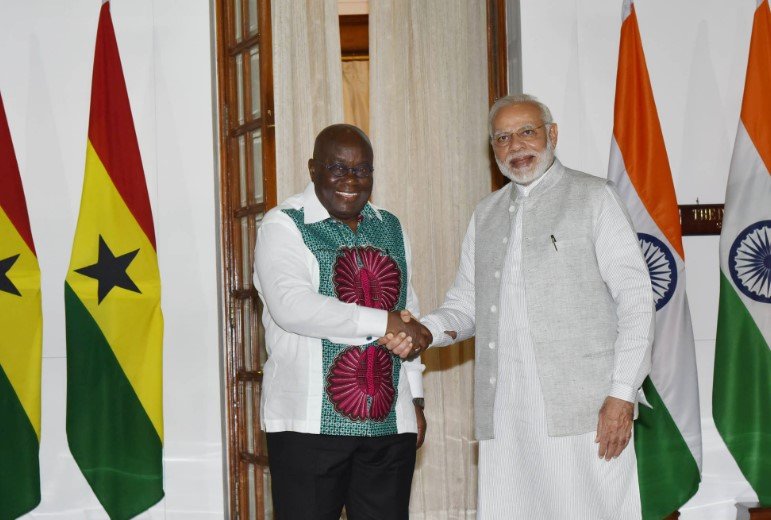Prime Minister Narendra Modi has been conferred with Ghana’s highest civilian honour, a gesture that underscores the deepening relationship between the two democracies and positions India as a growing force on the African diplomatic landscape.
Modi received the ‘Officer of the Order of the Star of Ghana’ from President John Dramani Mahama during his visit to Accra on Wednesday. He accepted the award “on behalf of 1.4 billion Indians,” dedicating it to the aspirations of India’s youth, its cultural fabric, and the enduring ties between the two nations.
A Symbol of Shared History and Newer Horizons
It’s not just a medal and a handshake. Ghana’s decision to honour Modi with its most prestigious civilian title is a nod to something deeper—decades of mutual respect that began before India’s own independence.
Ghana and India go back. Way back. Both were once colonies, both found freedom within a decade of each other, and both embraced democracy even before it became trendy. And their paths have crisscrossed ever since.
But this isn’t just about nostalgia. This award signals that Accra sees New Delhi not just as a trade partner, but a political ally too. A voice that matters.
That’s important at a time when China’s influence across the African continent is, frankly, enormous. India’s counterplay is subtler—but clearly not unnoticed.

From Pharmaceuticals to Politics: India’s Growing African Footprint
Modi’s brief stop in Accra wasn’t just ceremonial. His trip was packed with meetings, press statements, and behind-closed-doors trade conversations. And Ghana, one of Africa’s fastest-growing economies, wants more Indian involvement—not less.
In recent years, Indian companies have been quietly but consistently ramping up investment across sectors in Ghana—healthcare, education, IT, energy. But what often doesn’t make the headlines is how India’s generic pharmaceutical exports, for instance, help keep medicine affordable across Africa.
And yes, trade numbers matter too:
| Category | India–Ghana Trade FY 2024–25 (estimated) |
|---|---|
| Total Bilateral Trade | $6.4 billion |
| Indian Exports | $4.7 billion |
| Ghanaian Exports | $1.7 billion |
| Top Indian Exports | Pharmaceuticals, Machinery, Rice |
| Top Ghanaian Exports | Gold, Cocoa, Timber |
Those numbers may not raise eyebrows in Brussels or Washington. But in Accra and New Delhi? They’re meaningful.
More Than Medals: Youth, Democracy and Cultural Respect
Now here’s something that struck a chord. Modi didn’t just accept the honour with political boilerplate. He turned the spotlight on young Indians—their ambition, their dreams—and connected that to India’s global rise.
“There are 1.4 billion reasons to believe in democracy,” Modi reportedly said. “And most of them are under 35.” That line wasn’t scripted fluff. It was vintage Modi: part message, part mission.
He also referenced India’s cultural heritage and its pluralism. Ghana, too, is a patchwork of languages and communities. That shared complexity has helped foster a kind of mutual understanding that’s hard to manufacture. It’s organic.
And let’s be real—it’s not every day that a foreign leader gets this kind of warm, symbolic embrace in a foreign capital. Modi has racked up state honours before—from France, Saudi Arabia, Russia, and Egypt—but this one felt uniquely personal.
A Quiet but Calculated Foreign Policy Shift
India’s Africa strategy has always been low-drama compared to, say, Beijing’s infrastructure-heavy playbook or Washington’s big-budget aid packages. But that doesn’t mean it’s not working.
In fact, it may be working precisely because it doesn’t try to imitate others. Indian diplomacy in Africa leans heavily on shared histories, education partnerships, soft loans, and technical know-how rather than hard power.
Wednesday’s ceremony didn’t just cement Modi’s personal rapport with Ghana’s leadership. It signaled that India’s place in Africa’s diplomatic ecosystem is maturing—less transactional, more strategic.
Here’s why this matters:
-
India is the 4th largest investor in Africa
-
Nearly 40,000 African students study in Indian universities
-
Indian lines of credit to African countries have crossed $12 billion
All that—without boots on the ground or drama in the headlines.
Meanwhile, at Home: A Symbol of Foreign Validation
Back in India, the optics of this award won’t go unnoticed. Modi’s government has always framed global recognition as domestic validation. His receipt of Ghana’s highest honour will likely be used as evidence of India’s diplomatic clout—and Modi’s own image as a statesman with global pull.
And sure, critics might downplay the award. “It’s symbolic,” they’ll say. “It doesn’t change geopolitics overnight.”
But symbolism, when repeated often enough, becomes perception. And perception, in international politics, is a powerful currency.
Modi knows that. So does Mahama.
For now, what matters is that two countries—half a world apart—are still finding ways to strengthen a friendship forged by freedom struggles and carried forward by mutual respect.
India doesn’t shout its diplomacy from the rooftops. But sometimes, a quiet medal pinned in Accra says plenty.
